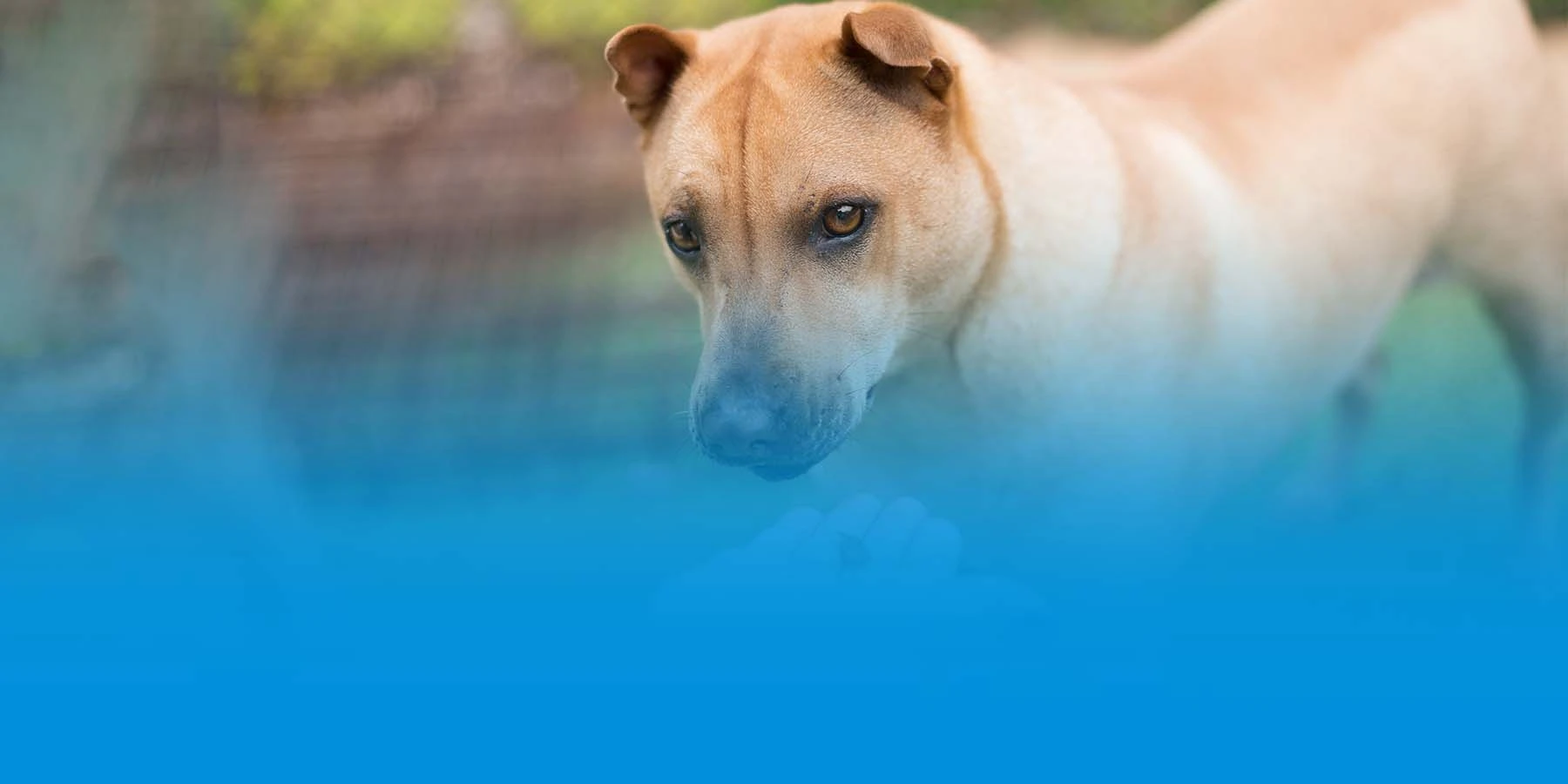PET HEALTH
Just like people, some dogs experience anxiety. One of the treatment options for dog anxiety disorders is a prescription for an antidepressant called trazodone.
In this guide, we’ll go over what trazodone is, its common uses, canine dosage, and possible side effects — so you can safely and confidently help manage your pup’s anxiety.
What Is Trazodone and What Does It Do for Dogs?
Trazodone is a serotonin antagonist/reuptake inhibitor (SARI) antidepressant used to treat both humans and dogs.1 It works by preventing too much serotonin from being reabsorbed, so more of it stays in the brain. Higher serotonin levels in the brain can help relieve anxiety and improve mood.2
Trazodone can help your dog feel calmer when they may typically be anxious or stressed — but it likely won’t address the root of their anxious behavior. This is why trazodone may be prescribed in addition to other treatments — such as training, behavior modification, or other medication(s).
Common uses for trazodone in dogs
Trazodone for dogs can help treat behavioral disorders related to stress or anxiety — like separation anxiety, noise or situational fears, aggression, and compulsive behavior. It’s generally used on an as-needed basis during situations that may cause increased anxiety, but it can also be used for long-term anxiety management.1
Some examples of situations when the short-term, sedative effects of trazodone may be helpful for your dog are:1
- Before a vet visit
- When you’re traveling
- When your dog is boarded or staying with someone other than you
- When company comes to visit your home
- After surgery or a procedure where your dog may need to be kept calm
- During storms, fireworks, nearby construction, or when other loud noises are ongoing
If your pup has general anxiety, your vet may prescribe trazodone as part of their management plan, since regular doses can have a longer-lasting positive effect on mood.1
A MetLife Pet Policy May Help Cover Dog Prescription Costs
Is Trazodone Safe for Dogs?
Trazodone is considered safe for dogs and is a commonly prescribed drug under extra-label use.1 This just means veterinarians are legally able to use “extra-label” drugs approved by the U.S. Food and Drug Administration (FDA) in a way that’s not listed on the label.3
There are a few situations in which trazodone should not be used, or there may be a better option:1
- Dogs who have a sensitivity or are allergic to the drug should not take it.
- Dogs with angle-closure glaucoma should find a different medication.
- If your dog is pregnant, has kidney or liver impairment, or has severe heart disease, they should take this medication cautiously.
To help ensure your dog takes trazodone safely, let’s look at some other risk factors.
Other possible risks and drug interactions
Sometimes, adverse reactions can occur when certain drugs are taken together. Your dog may be prescribed something other than trazodone if they’re already on medications like monoamine oxidase inhibitors (MAOIs), antihypersensitive drugs, aspirin, diuretics, certain antidepressants and depressants, certain antibiotics and antifungals, tramadol, or non-steroidal anti-inflammatories (NSAIDs).1
This is not an exhaustive list, so make sure to tell your vet about any medication, supplements, or vitamins your dog is taking before being prescribed trazodone.
How Is Trazodone Given to Dogs?
Trazodone is available in tablets you can give to your dog by mouth, with or without food. If your dog tends to feel sick when they take medicine, giving it to them with something they love, such as their favorite treat, can help keep their stomach settled while the medication kicks in.1
Since this medication may be given as needed or at regular intervals, it’s important to follow your vet’s instructions.1
If your dog is prescribed trazodone at regular intervals and you miss a dose, note the time you realized it was missed. If you’re close to the next scheduled dose, skip the one you missed and give them their next dose when it’s time — you don’t want to double up on doses.1 When in doubt, call your vet to ask how you should proceed.
What Is the Trazodone Dosage for Dogs?
The dosage of trazodone for your dog depends on their weight and what it’s being used to treat. For as-needed cases, your vet will likely prescribe a different dose than if your dog were to take trazodone regularly.
If your dog is taking trazodone on an as-needed basis, you’ll be able to see it start working in about 1 or 2 hours. Trazodone taken daily for long-term management may take a few weeks before you notice the full effects.1
Every dog experiences the effects of trazodone differently, but one dose will likely stop working in about 24 hours. Dogs with kidney or liver disease, however, may feel the effects for longer.1
What Are Some Trazodone Side Effects for Dogs?
Trazodone may have mild side effects in dogs, including:1
- Sedation or lethargy
- Loss of muscle control
- Increased appetite
- Dilated pupils
- Vomiting or gagging
- Aggression, increased anxiety, or irregular heartbeat
Monitor your dog after giving them trazodone, and contact your vet or an emergency clinic if you notice any negative side effects or adverse reactions. Keep in mind that mild sedation may not be cause for alarm as it’s a common side effect of the way the drug works.
Serotonin syndrome
One of the more serious potential side effects that could occur is serotonin syndrome — i.e., there’s too much serotonin in the body.1,2 Some of the signs that may indicate serotonin syndrome include:1,2
- Vomiting and diarrhea
- Dilated pupils
- Fever
- Skin sensitivity
- Seizures, loss of control of movements, or paralysis
- Over-salivation
- Difficulty breathing
- Disorientation or blindness
If you notice any of these signs after giving your dog trazodone, call your vet or an emergency clinic immediately as it could become fatal if not promptly treated.2
How Much Does Trazodone for Dogs Cost?
The cost of trazodone for dogs depends on where you get the prescription filled, the dose per tablet, and whether your dog needs to take it regularly or as needed.
You may pay more if your prescription is filled at the vet, but retail websites might have tablets for less. Once you know the dose your vet recommends, you’ll be able to get a better idea of how much it will cost.
Are There Any Alternatives to Trazodone?
If your dog can’t take trazodone, talk with your vet about potential alternatives. You may be able to take advantage of cannabidiol (CBD) products, Thundershirts, chews or toys, behavioral training to calm anxiety, or other anti-anxiety medication and supplements.
CBD treats and oils made specifically for dogs may help reduce anxiety. Just talk with your vet before trying this alternative approach to see if it’s safe for your dog.
Relieve Some Stress With a Dog Insurance Policy
You can help your dog work through their stress and anxiety with a treatment plan that may include trazodone, other medications, and/or behavioral training. Enrolling them in a dog insurance policy could help offset the costs of future care they may need.
MetLife Pet’s insurance policies can include coverage for things like prescriptions, treatments, holistic therapies, and exams. Plus, if your vet recommends behavioral training for treating your pup’s anxiety, our optional Preventive Care plan may help cover it. Get your pup what they need to feel their best while helping protect your finances — start with a free quote.
Dr. Hunter Finn has been paid by MetLife to discuss the importance of choosing pet insurance. He is an integrative veterinary expert first, and social media star second. America’s favorite veterinarian owns Pet Method in McKinney, Texas, where he cares for pets while prioritizing their emotional well-being. When he’s not at his clinic, he’s starring in viral videos on TikTok (2 million followers) and Instagram (500K followers) — where he’s been known to snuggle puppies and conquer the latest dance trends.



